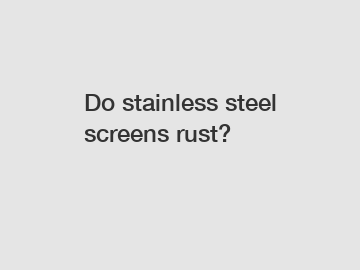Do stainless steel screens rust?
Do Stainless Steel Screens Rust?
Stainless steel screens are widely used in various industries and applications due to their durability and corrosion resistance. These screens are designed to withstand harsh conditions and are often subjected to exposure to moisture and other corrosive elements. However, one question that frequently arises is whether stainless steel screens can rust. In this article, we will explore this topic and provide you with a comprehensive understanding of the subject.
Understanding Stainless Steel.

To understand whether stainless steel screens can rust, it is essential to have a basic understanding of stainless steel itself. Stainless steel is an alloy composed primarily of iron, along with a combination of chromium, nickel, and other elements. These additional elements enhance its resistance to corrosion, making it suitable for various applications.
Types of Stainless Steel Screens.
Before delving into whether or not stainless steel screens can rust, it is important to note that there are different types of stainless steel screens available. The two most commonly used types are 304 stainless steel and 316 stainless steel screens. While both types offer excellent resistance to corrosion, 316 stainless steel screens have an added advantage. They contain higher levels of nickel and molybdenum, making them even more resistant to corrosion than 304 stainless steel screens. Consequently, 316 stainless steel screens are often preferred for applications where there is a high risk of exposure to corrosive environments.
Corrosion Resistance of Stainless Steel Screens.
Stainless steel screens, including both 304 and 316 stainless steel screens, possess remarkable corrosion resistance properties. This resistance is primarily due to the passive layer that forms on the surface of the stainless steel when exposed to oxygen. This passive layer, composed of chromium oxide, protects the underlying steel from corrosion by preventing the access of corrosive agents. As a result, stainless steel screens are known for their excellent resistance to rust, staining, and corrosion in general.
Factors Influencing Stainless Steel Screen Corrosion.
Although stainless steel screens are highly resistant to corrosion, various factors can influence their rusting potential. These factors include exposure to chlorides, acids, high temperatures, and mechanical damage. Chlorides, such as those found in marine environments and certain cleaning agents, can compromise the protective passive layer, leading to localized corrosion known as pitting.
Additionally, prolonged exposure to highly acidic or alkaline environments can degrade the passive layer and increase the risk of corrosion. High temperatures can also affect the protective properties of stainless steel screens, altering their resistance to corrosion. Lastly, mechanical damage, such as scratches, cuts, or abrasions, can compromise the passive layer's integrity, making the screens susceptible to rust.
Conclusion.
In conclusion, stainless steel screens, whether 304 or 316 grade, offer exceptional resistance to rust and corrosion. However, it is essential to consider the specific application, environmental factors, and maintenance practices to ensure optimal performance and longevity of stainless steel screens. By selecting the appropriate grade and implementing proper care and maintenance, stainless steel screens can provide reliable service and remain free from rust for extended periods.
If you have any more questions regarding stainless steel screens or require further assistance, please do not hesitate to contact us. We are here to provide you with the information and support you need.
For more Anti Climb Mesh Suppliers, Fiberglass screens for different window sizes, High-quality metal wire mesh for long-lasting useinformation, please contact us. We will provide professional answers.


